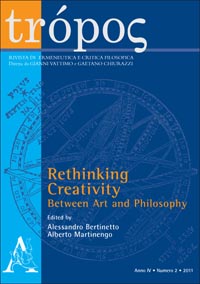On Attributing Artistic Creativity
DOI:
https://doi.org/10.13135/2036-542X/7596Keywords:
creativity, art, aesthetics, medium, sincerityAbstract
This article argues that conceptions of artistic creativity and thus the practices of the artworld are centrally regulated by an ideal of an artist who personally undergoes experiences of novelty, originality, uniqueness, or surprise. Such subjective creativity responses arise largely due to the artistic media that invariably defy complete control by the artist – a fact that is not only accepted by many artists themselves but also often regarded by them as highly desirable. Consequently, at the heart of artistic creativity there lies an opposition to a fluent ‘extension of the mind into the medium', unlike in other fields of expertise where mastery is indicated by automatism and increasing transparency of tools. This provides a counterargument to theories that see the criterion of art status in successfully realized artistic intentions. Further, it is argued that the belief in artists’ subjective creativity responses differentiates artistic creativity from creative problem solving in general. This constitutes a sincerity requirement for artistic creativity that also seems highly resistant to challenges by individual artists. The crucial role of artistic media in eliciting artists’ creativity responses, and thus in grounding attributions of artistic creativity, is not duly recognized by theories which see the gist of artistic creativity in conceptual restructuring or innovation.


